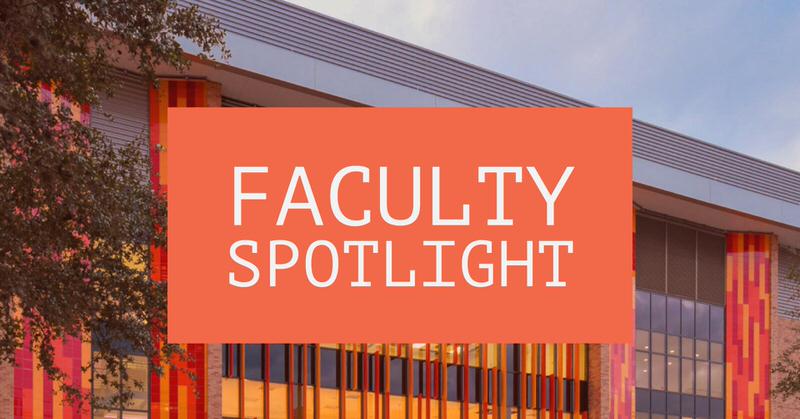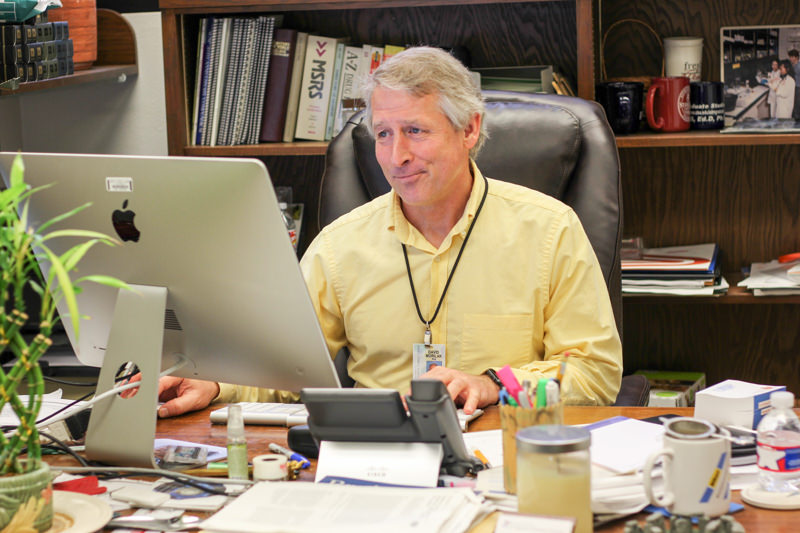Faculty Spotlight: 9 Questions With Dr. David Morilak
Nine quick questions with Dr. David Morilak, Center for Biomedical Neuroscience, Director and Professor of Pharmacology.
1) Please tell me about yourself.
I was born and raised in Cleveland, Ohio (but I’m a 100% Spurs fan!). I was an undergraduate at Muskingum University, a small liberal arts school in rural southern Ohio.
I got my Ph.D. in Neuroscience from Princeton University working with Barry Jacobs, then did a post-doc with John Chalmers at the Flinders University Medical Centre in Adelaide Australia (where I learned to appreciate wine).
I then did a second post-doc with Roland Ciaranello at Stanford before coming here for my first and only faculty position. My wife Susan is a dog trainer at PetSmart at The Rim. And I have two adult children. My daughter Nicole is a Physical Therapist in Phoenix, and my son Matt works for Apple (among many other part time jobs and hobbies). He is well-known here at the HSC as he was a part-time IT Assistant in the Department of Pharmacology. He is currently doing an internship at Apple headquarters in California.
2) What brought you to UT Health San Antonio?
It’s actually a good story about taking advantage of unexpected opportunities. I was working late one Friday evening at Stanford when my supervisor asked me out of the blue if I wanted to go to Spain. I said sure, and he handed me a ticket and said “your flight leaves Sunday evening, you present on Tuesday morning and you come home that afternoon.”
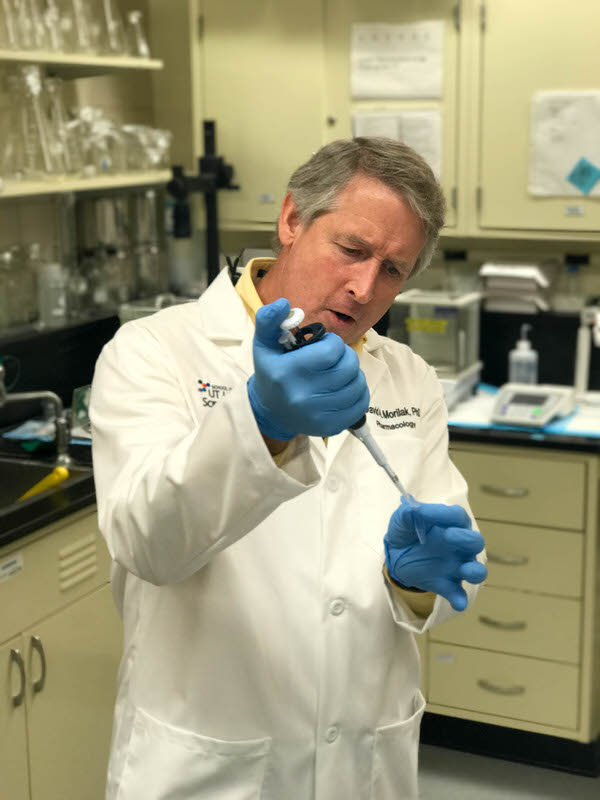 I didn’t know if he was kidding or what, so I guess I just stood there with my mouth open not sure how to respond. He then explained that he was supposed to give a talk at the
I didn’t know if he was kidding or what, so I guess I just stood there with my mouth open not sure how to respond. He then explained that he was supposed to give a talk at the
European College of Neuropsychopharmacology (ECNP) meeting but something had come up and he couldn’t make it. So I was to fill in. No problem, right? I had no idea what the meeting was, and at that time we did not have powerpoint, we used real slides.
So I took along a huge 3-ring binder full of all my 2×2 slides and literally assembled my talk on the plane. It was only when I arrived that I found out this was actually a really big deal. It was the Presidential Symposium of the
American College of Neuropsychopharmacology presented at the invitation of the ECNP.
My co-speakers were the President of the ACNP and three other very prominent and highly placed members of the society. Well, I guess I held my own at dinner that night (I had not slept in over 36 hours!), and I gave my talk the next day as if I actually belonged in that distinguished group! One of the panel members happened to be
Alan Frazer, who had just accepted the position of chair of the Department of Pharmacology at The University of Texas Health Science Center at San Antonio.
As I was leaving the hotel to head home, he asked if I was thinking about looking for a faculty position. It was the right time in my career, so when I said yes he told me to send him a C.V. as he was just starting to put together a search committee for the first open recruit into his department (he had not even moved to San Antonio yet). Texas had never been on my map, but I learned quickly where San Antonio was, and came to appreciate what an opportunity it offered. The rest, as they say, is history…
3) Tell me about your research interests and why you are passionate about this topic?
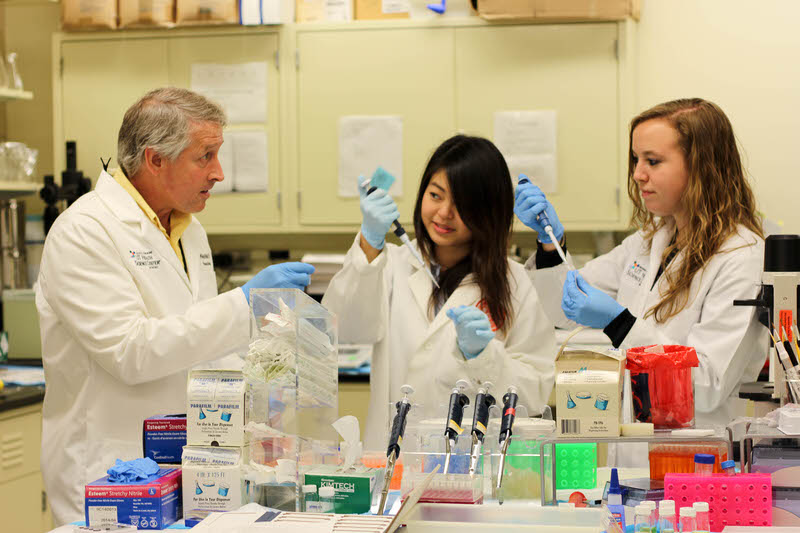 I guess this goes back to what drew me into science in the first place. Growing up right through high school I wanted to be a lawyer. I guess I thought it was really cool how Perry Mason won all his cases in dramatic fashion with a surprise ending in exactly one hour! But then, in my senior year, I took a Health class taught by the football
I guess this goes back to what drew me into science in the first place. Growing up right through high school I wanted to be a lawyer. I guess I thought it was really cool how Perry Mason won all his cases in dramatic fashion with a surprise ending in exactly one hour! But then, in my senior year, I took a Health class taught by the football
coach. We watched a lot of movies! One of those movies was on mental illness, and I was absolutely mesmerized. Listening to an individual with schizophrenia talk as he wandered in and out of reality struck me to my core – I could not grasp how someone could be so not in touch with what is real and concrete, and could perceive the world, even their own sense of self, so differently from what the rest of us see and perceive. So I decided at that moment that I would cure schizophrenia!
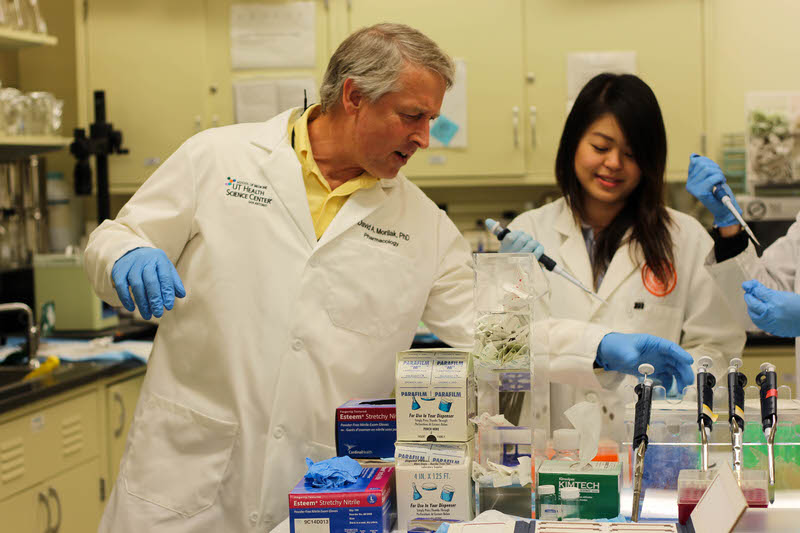 As a Psychology major at college, two things shaped what I ultimately would end up doing. One was a semester internship at a state mental hospital where it became strikingly clear to me that in order to fix brains that don’t work the way they should, you had to first know something about how the brain works in the first place. This took me beyond Psychology to Neuroscience. And I had the opportunity to do real wet lab research with a new faculty member in our department who was a neuroscientist, and then to work in a research intensive department at Kent State as a Summer Undergraduate Research Fellow student – that is one reason I am such an avid supporter of our various undergraduate research programs here at UT Health San Antonio.
As a Psychology major at college, two things shaped what I ultimately would end up doing. One was a semester internship at a state mental hospital where it became strikingly clear to me that in order to fix brains that don’t work the way they should, you had to first know something about how the brain works in the first place. This took me beyond Psychology to Neuroscience. And I had the opportunity to do real wet lab research with a new faculty member in our department who was a neuroscientist, and then to work in a research intensive department at Kent State as a Summer Undergraduate Research Fellow student – that is one reason I am such an avid supporter of our various undergraduate research programs here at UT Health San Antonio.
So then I became a neuroscientist, and I never lost my fascination with how the cellular and molecular functions of the brain translate into the complex thoughts, emotions, perceptions and consciousness that define us as individuals. And I maintain the early the desire to improve the treatment of serious mental illness. My research focuses on stress and how the changes induced in the brain, either as part of the stress response or as a consequence of chronic or severe stress, can predispose to major psychiatric disorders. On the flip side of that, we study mechanisms of both traditional and novel therapeutics.
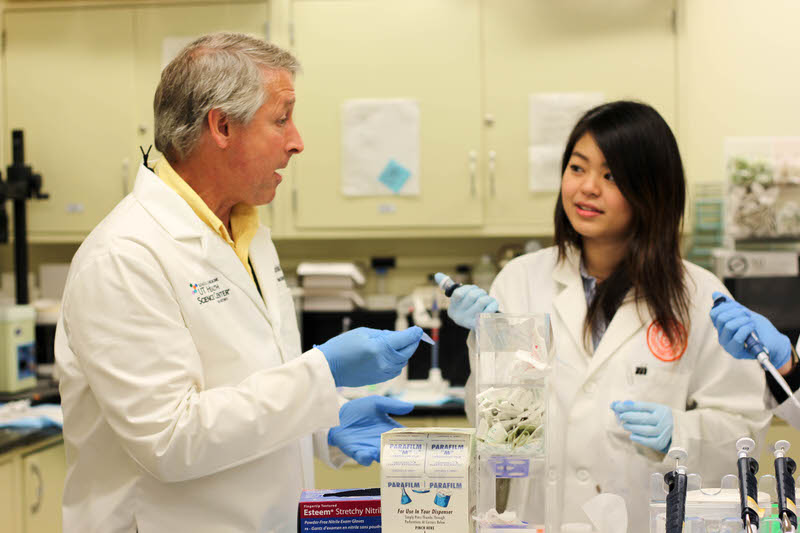 4) What do you want the public to know about your research? Why is your topic important?
4) What do you want the public to know about your research? Why is your topic important?
Everyone here is doing interesting and important research, and we are all very passionate about improving lives and the human condition. So rather than say something to the public about my research specifically, I would instead encourage people to support research, science and education in general.
Research is the search for truth, what is rather than what we believe should be. Education is how we disseminate that truth to the entire population.
Education is the key to a mature, rationale, successful society that cannot be swayed or duped by propaganda or showmanship. It is so important to who we are as a country, and right now it is so threatened, that I simply want the public to know that what we are doing here is worthwhile, it is noble, and it is of tremendous value.
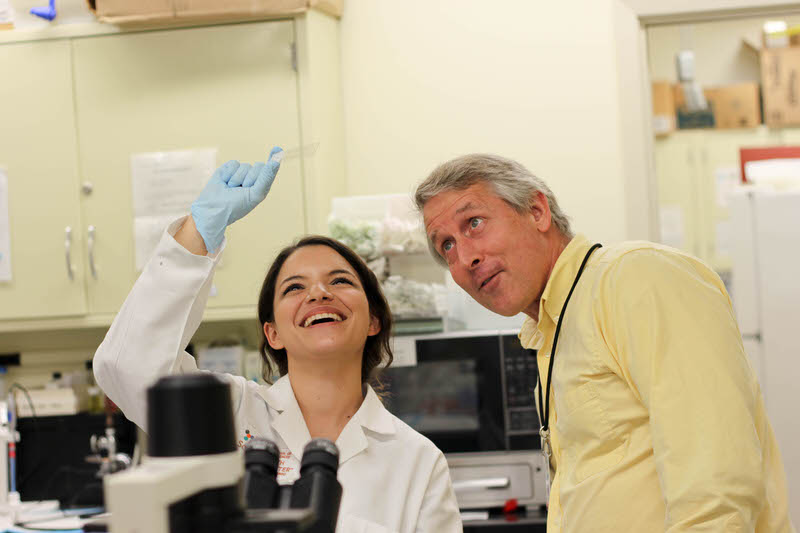 5) What is your favorite part of your job?
5) What is your favorite part of your job?
I still get a thrill when we discover something new – and it doesn’t matter how monumental or small, when you discover new knowledge, it is like being the first man to land on the moon – nobody else has ever had that piece of knowledge before, and nobody else from now on will ever again be the first to have it. That is a rush!
6) What is the most challenging part of your job?
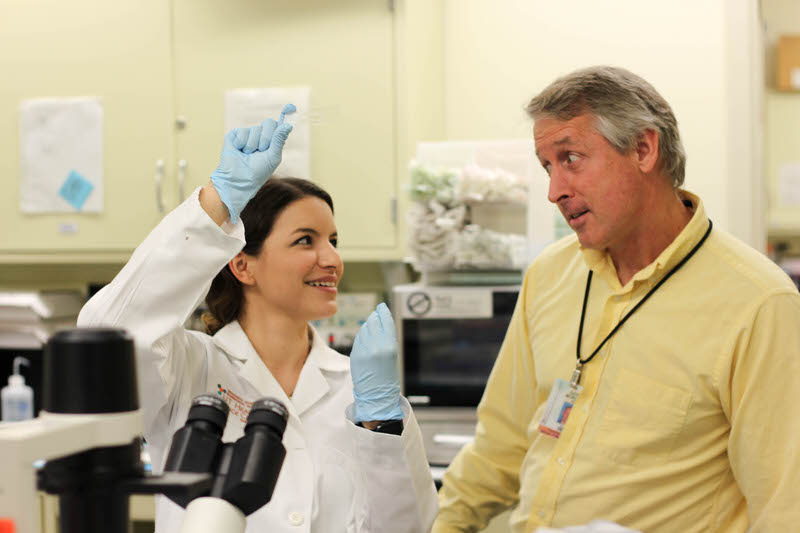 As you advance and become successful you often can find yourself doing less of what you did to achieve that success in the first place. I enjoy assuming leadership positions to contribute to something bigger than just myself or just my lab. But with that often comes a lot of responsibility for administrative and bureaucratic, and sometimes political stuff that is not nearly as fun as being in the lab.
As you advance and become successful you often can find yourself doing less of what you did to achieve that success in the first place. I enjoy assuming leadership positions to contribute to something bigger than just myself or just my lab. But with that often comes a lot of responsibility for administrative and bureaucratic, and sometimes political stuff that is not nearly as fun as being in the lab.
So I often refresh myself by just wandering down to the lab to hang out with my trainees and soak up the atmosphere of discovery. And of course I meet with them every day, we plan experiments, interpret data, write it for publication, and I still give those big talks and seminars, but I get to use powerpoint now!
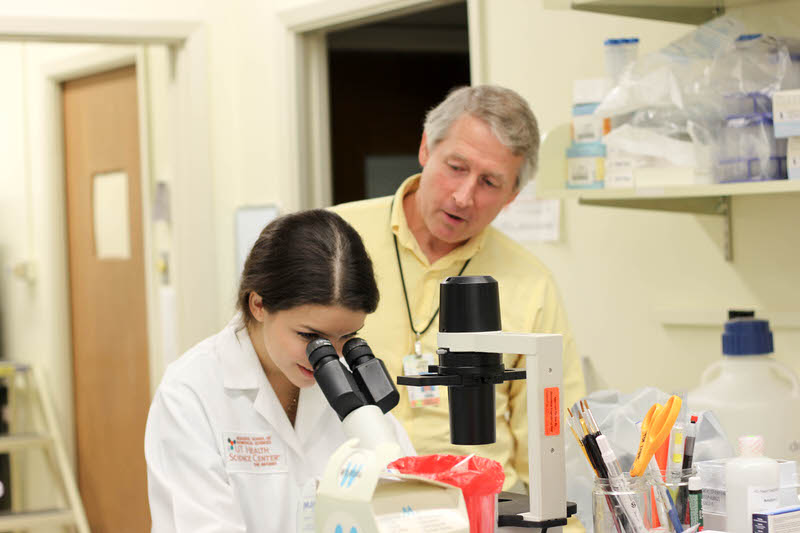 7) What do you like most about mentoring students?
7) What do you like most about mentoring students?
I love the energy, enthusiasm, and the wide-eyed creativity that students possess. My job often is to channel their energy and enthusiasm into practical and productive directions, but sometimes you just have to let them go and see what they come up with – and it is often both surprising and interesting! This job, as long as you are willing to keep pushing yourself into new territory that you might not have expected to visit, is never boring!
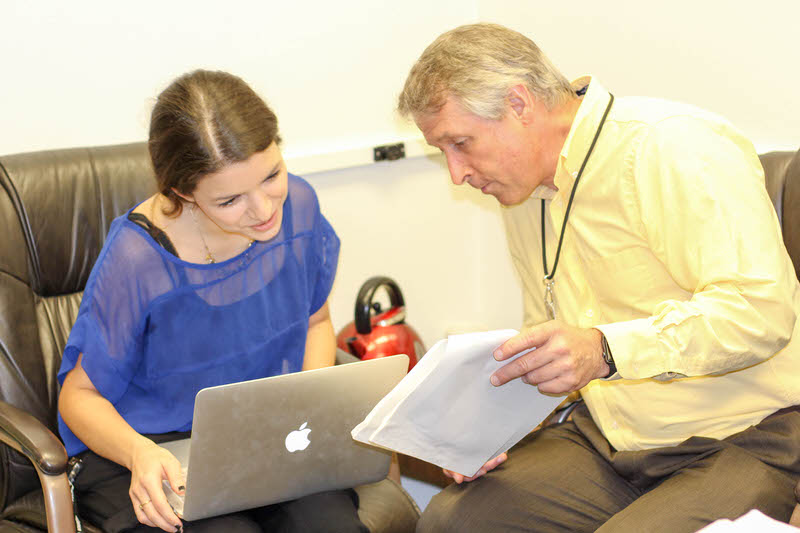 8) How do you like to spend your free time?
8) How do you like to spend your free time?
I enjoy jazz music, good wine, and good food. I watch the Spurs religiously. I enjoy a good zombie movie. I actually like to hang out with my lab – they are fun and interesting people as well as accomplished scientists! My wife and I like to cook, although I will be honest, I don’t do that enough.
9) What is the most helpful advice you’ve received?
When you hit a setback, don’t take it personally. And give your failures an appropriate period of mourning, then pick your pants up and get back to work. There are more that I can’t repeat here….
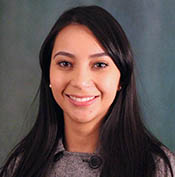 Liliana Espinoza is a graduate student in the Neuroscience discipline of the Integrated Biomedical Sciences program. The “Beyond The Bench” series features articles written by students and postdoctoral fellows at The University of Texas Health Science Center San Antonio.
Liliana Espinoza is a graduate student in the Neuroscience discipline of the Integrated Biomedical Sciences program. The “Beyond The Bench” series features articles written by students and postdoctoral fellows at The University of Texas Health Science Center San Antonio.

